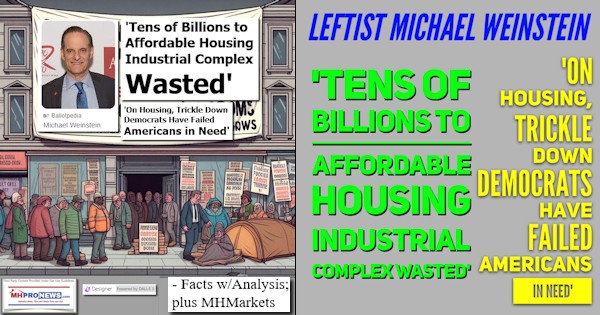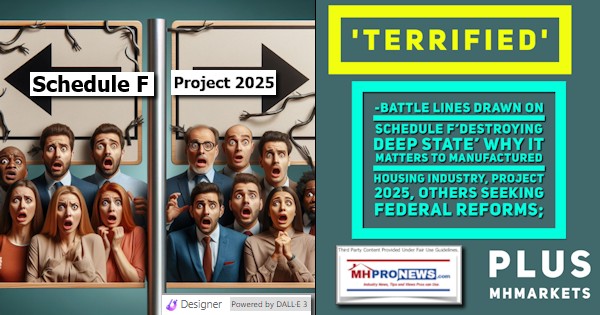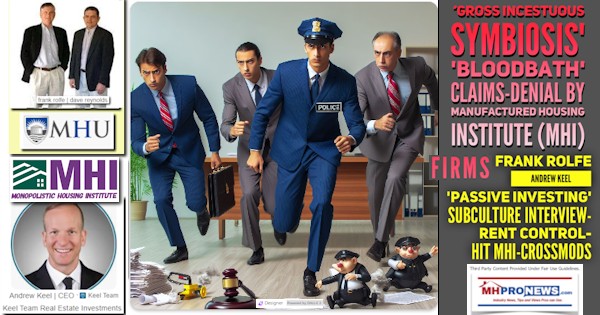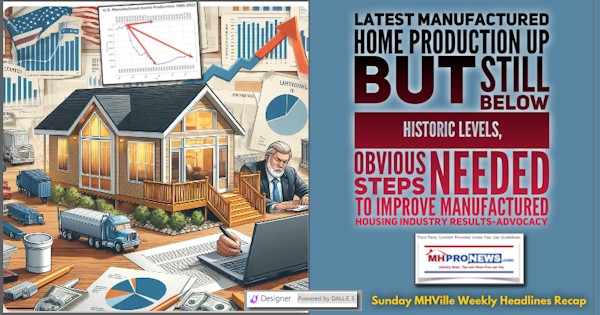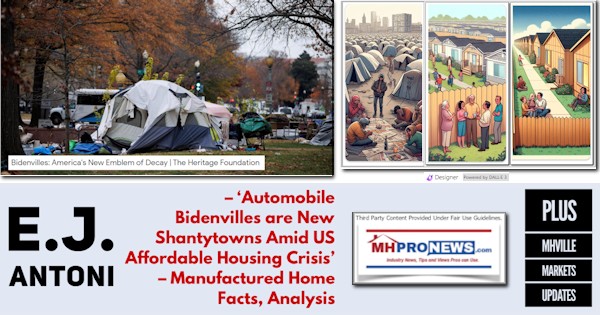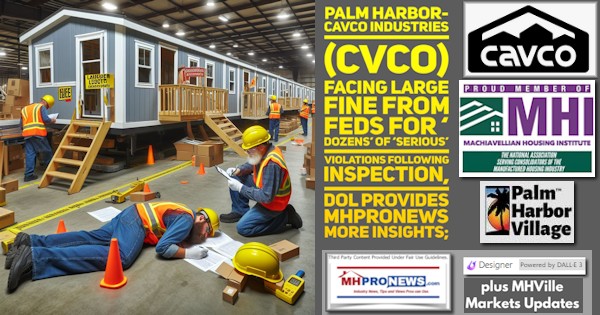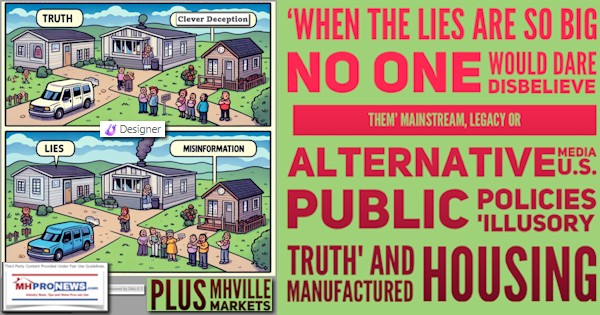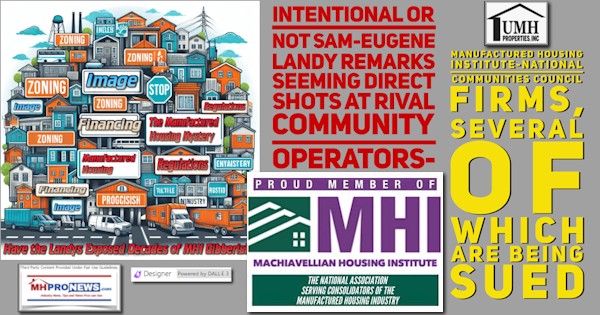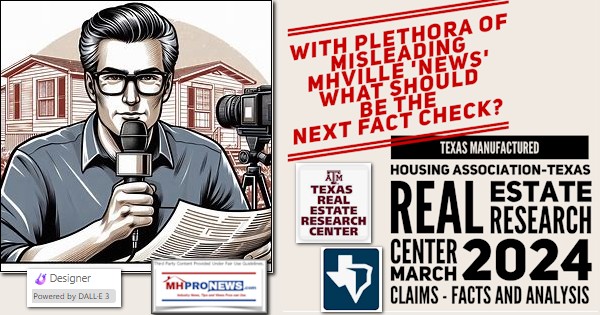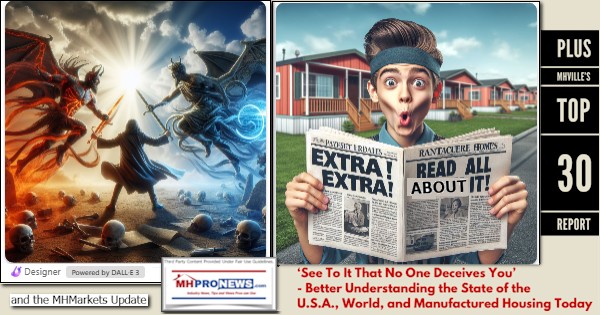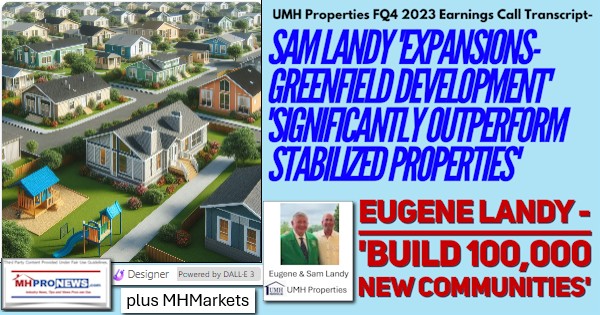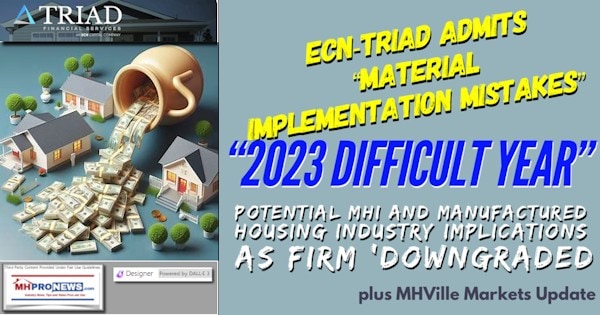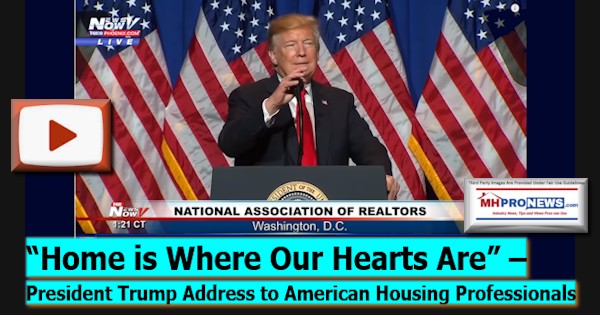
The National Association of Realtors (NAR) reported a slight dip in the sales of existing homes, which will be part of a planned upcoming report. But real estate in general is seen as strong. But the need for housing is strong, which is a factor fueling the steady rise of prices in most parts of the country.
Against that backdrop, the Daily Business News on MHProNews shares the recent speech by President Donald J. Trump to the NAR in Washington, D.C. HUD Secretary Carson was in attendance too, and we’ll link his relevant and related address to manufactured housing professionals, at this link here. The 45th president references the HUD Secretary’s work several times during a roughly one hour speech.
The pull quotes that will follow the video of the entire talk by POTUS Trump are from Inman, who’s full report on this talk by President Trump is linked here.
The president – who spent decades in real estate, developing, and building – very much has the feel of a professional talking to a group of friends. He’s clearly comfortable. The president kids with them, and the audience applauds – or boos – in a friendly, joking manner.
This address is useful to understanding the Trump Administration’s approach to many issues, and how much he respects the housing industry.
With those thoughts, let’s dive into the video and some pull quotes. The linked comments under lending and housing finance reform topics are not in the original but were edited in by MHProNews to connect it to manufactured housing related reports.
Opening Comments from President Trump
“Home is where our hearts are. And all of you, as Americans, you find a home for the ones that you love the most. So today, I want to thank all of you. This is a time of extraordinary opportunity for our country. And as I said, I think our country is doing better now than we’ve ever done before, as an economy. And I think it’s going to get even better. (Applause.)
We’re the envy of the world. There’s only — truly never been a better time, in my opinion, to build and break ground in America. People are making a lot of money and they’re doing well. And jobs are so good. And so many positive things are happening.
We’ve added nearly 6 million jobs since my election, including more than 120,000 real estate jobs. You believe that? (Applause.) See, I view that as a negative. I say, “120,000 more people that we have to compete with.” Right? (Laughter.) What do we need that for?
We’ve also gained more than 650,000 new construction jobs. (Applause.) And, you know — and if you remember, when I first came here — and if you remember three years ago, four years ago, five years ago, it wasn’t so good. But right now, America really is, once again, a nation of builders. We’re building again. (Applause.)
More than 5 million Americans have been lifted off food stamps, and we’re getting Americans off of welfare and back into the workforce. That’s a great thing. (Applause.) Great thing. That’s a great thing. I mean, you think of that: Five million people off of food stamps. You know what that costs? First of all, it’s a tragedy. But you know what that costs? So they’re off and now they’re working. So they’re actually paying taxes instead of — really, it’s costing a lot of money. Food stamps is very expensive.”
Improving Economy, Draining Swamp
“And after years of stagnation, wages are rising fast, with the quickest growth for blue-collar workers. The best statistic of all — and people don’t know. Everyone is doing great. The rich are doing great. The not-so-rich are doing great. The middle income is doing the best. But the best of all: The blue-collar worker has the biggest percentage increase of anybody. And that’s beautiful. (Applause.)
And these things didn’t just happen by accident. They happened because we are taking out this power out of Washington — these bad people — and returning it to the American people, where it belongs. Just think about Comey and these characters. Think about Comey and the gang. (Applause.) Drain the swamp. Drain the swamp.
Comey, Brennan, Clapper — we’re draining the swamp, folks. (Applause.) And you think it’s easy? It’s not easy. It’s not easy, but we’re doing it. We’re getting rid of a lot bad ones.”
Realtors, Farmers, Ranchers…
And we’ve also done something that, for this room, and for farmers, and for ranchers, and for, you know, small businesses — fairly big businesses, actually — we’ve virtually eliminated the very unfair estate tax, also known as the death tax. So — — (applause) — so, if you want to leave your real estate company to your child or your children — they like real estate, they have an aptitude, and you love them, and they love you; otherwise don’t do it. To hell with them. (Laughter.)
…
But what we have now is you don’t have to pay any estate taxes. You know what that is? That’s a big deal. Because a lot of times — and it happened with the farmers, where in some cases, they’re land rich, but not income rich, but the farm has been in the family for 150 years, and they love it, and they do well, and that’s what they do, and they love it. They wouldn’t want to do anything else. And they die and it would taxed on the value of the land, and all sorts of things happened. Then they go to the banks and they borrow money. And then they have a little down spell and they end up losing the farm, losing the business. You have no tax to pay anymore. And nobody talks about it, but to me that’s a big thing. That’s a big thing. (Applause.)
Opportunity Zones, HUD Secretary Ben Carson
“And thanks to the Opportunity Zones — where Ben Carson has been working so hard — (applause) — right? — made possible by tax reform, we’re making enormous investments in distressed communities. Tremendous.
I will tell you this — and, Ben, I think you can agree with me. He has to agree. (Laughter.) By the way, if he doesn’t, he will tell me. I guarantee. He’ll stand up and say, “Sir, I disagree with you there.”
It’s amazing the way it’s worked out. Do you agree? I had no idea. Tim Scott was very much involved. And we did it. And, you know, I’ve been hearing about these things for 40 years. “Oh, we’re going to do this; we’re going to do that.” Nothing works. These things have become tremendously successful. Tremendously successful in areas where money was never invested.
Very, very big, powerful, rich people are spending tremendous amounts of money. They have certain tax advantages, but we’ve got them to open their wallets, and the jobs that are being created in neighborhoods where people wouldn’t go before.
The Opportunity Zones — and it’s starting to be seen, and it’s starting to be written about — it’s a great achievement for Tim Scott. It’s a great achievement for Ben Carson. It’s really a — some of the people that those — the early people, Ben, that worked. Who else would you say, Ben? Four or five people that really were in the front — the forefront. But you two, I’d say, in particular. I’m going to get myself in trouble with the other three, but I’m not going to bother because you people don’t care who the hell they are. (Laughter.)
But they know they did a good job. Right, Ben? (Laughter.) They know they did a good job. (Applause.)”
Bob, opportunity zones
- TURNER: Thank you, Mr. President. What an honor to be here today.
AUDIENCE MEMBER: Yeah, Bob!
- TURNER: (Laughs.) Thanks. Thank you so much for this great economy. When you were elected, in Memphis, the cloud lifted off of Memphis and the economy took off. It really did. (Applause.) And the Opportunity Zones are creating so many opportunities for everybody across this country. And you came to Millington, Tennessee, a couple of years ago.
THE PRESIDENT: That’s right.
- TURNER: About a mile from where you landed, we own 47 acres that are in the Opportunity Zone. We’re developing 247 units of apartments, and we’re building 71 single-family home lots on this 47 acres. We will create about $40 million of economic development in Millington, Tennessee. (Applause.)
Millington has not seen any new developments for over 10 years. No new apartments, very few houses, and it’s home of the naval air station — naval base — with your fine patriots. And it’s going to make a change in that town.
We’re also developing a large development in Memphis. It’s 1,500 apartments, a hotel, and about 3,500 square-foot of retail space that will create about $400 million in economic development. It’s not in an Opportunity Zone, but it’s creating a tremendous amount of jobs in Memphis. (Applause.)
THE PRESIDENT: Great. Great place.
- TURNER: Yep. So, as realtors across this country, we’ve been talking about this all this week, and I’ve told them they are the catalyst for this Opportunity Zone with Mr. Carson and President Trump. And without it, we would not be able to revitalize these communities that need help.
I had the opportunity to come to the White House and represent our realtors in your economic summit for the Opportunity Zone, and I thought it was all about real estate. But it’s about workforce, it’s about housing, it’s about every kind of economic development you can do in these zones. And it’s really going to make a difference.
As you said, the money is flowing. The day that you all released those rules, the faucet turned on. There is hundreds of millions of dollars looking for a place to invest in your communities. And this group here, Mr. President, is in the center of it. (Applause.)
Our realtors are going to create this situation in every city and town across the country and be the catalyst for building these Opportunity Zones out to put people to work and put people in homes, and revitalize our nation. And we — on behalf of the realtors, we want to thank you. (Applause.)
THE PRESIDENT: Thank you very much.
- TURNER: And I want to say one more thing. (Applause.) Thank you, Mr. President, for making America great again. (Applause.)
THE PRESIDENT: Thank you, Bob. Wow. That’s from the heart. No notes, no nothing. That’s from the heart.”
Lifting Undue Regulations Leads to Growth
So as our economy booms like never before, we’re lifting millions of our citizens from welfare to work, dependence to independence, and poverty to prosperity.
But as everyone in this business knows, nothing kills economic growth faster than government bureaucrats, regulation. With all that power and not enough common sense, lots of bad things can happen quickly. And that’s why we’re waging a historic deregulation campaign that especially affects the real estate business. And that’s liberating our citizens from bureaucracy and freeing our economy to soar higher than ever. And it can continue to go up.
To see the disastrous results of over-regulation, you take a look at what’s going on in California. Housing costs are among the highest in the country. Development restrictions make it sometimes impossible to build. What they do — I mean, years and years of turmoil. I have one job, it’s called the Coastal Commission. Oh, they’re fun to deal with. (Laughter.) If you’re really good, you’ll have your permits within 20 years, or not have them within 20 years. “We vote no.” “Wait a minute, we’ve been looking at these things for 20 years.” “We vote no.” How about that?”
…
“How about when you’re looking at a permit, you’ve devoted millions and millions of dollars, and you go into that hearing, after years, and you have no idea if they’re going to vote yes or no? And oftentimes, they vote no. So we’re trying to end that.
State and local regulations can easily add $200,000 to the price of a single home. And it’s no surprise that in California — and I don’t want to single them out, but they have a train going up now — you know, this fast train? You heard about this disaster? (Laughter and applause.) I mean, you people know how to build on time, on budget — preferably ahead of time and under budget, right? This is a train that’s not working out so well. It’s a fast train, but not a bullet train. So it’s not that fast. (Laughter.) And it was going to go from San Francisco to Los Angeles. And then, a thing called cost overruns happened. And many of you know about it — well, it’s in the thing today because I said, “We’re not paying any more money for it. California has lost control.”
California and the Bullet Train
“What a minute, what are they doing? You got an airline that goes from San Francisco to Los Angeles much faster, and it’s less money. So how does this work?”
And again, it’s not that really fast train; it’s just a fast train. (Laughter.) Meaning, it’s slow. (Laughter.) Meaning — meaning, it’s obsolete, right? You know, it’s obsolete before — if you’re going to do it, you do the bullet train. You do the really fast deal. So it’s obsolete before they start.”
Global Warming vs. Forest Management
“But they had a way of doing it. They were going to show me — the [CA] Governor — a nice guy. A nice, young guy. (Laughter.) Talking about forests — clean up your forests; you won’t have forest fires. Clean them up. He blames it on global warming. I said, “No, try cleaning the floor of the forest a little bit so you don’t have four feet of leaves and broken trees that have sit there for 25 years.” (Applause.) “Try cleaning the floor of the forest. You won’t have forest fires.” (Applause.) And I got killed for that. It’s called “forest management.” I got killed for that. And then, about three weeks later, they announced I was right. (Laughter.) Because I was out there last year and what I saw was so horrific with some of the fires — so many people killed. The fire was — you talk about bullets, the fire was like a bullet.”
Developing, Regulatory Story Telling and Corrupt, “Rigged System” Example
The president told a story about a development of his that never took place, and why he thinks it failed to come to fruition.
“And how did [environmental/regulatory] people find out about the lake? My consultant told them. Because, this way, you have to use your environmental consultant longer, pay them more money to get you out of the jam. Isn’t that nice? (Laughter.) I fired his ass so fast. (Laughter and applause.) True story. It’s a true story. A true story.”
Low Unemployment, High Employment
“The unemployment numbers are great, but the employment numbers are even better. We have the most people working today than at any time in the history of our country. We have almost 160 million people working. (Applause.)
And many of those people are going to go out and buy a house. Right, Tracy? They’re going to use you as the broker. (Applause.) They’re going to call — “Tracy, I want to buy a house. And I won’t pay you 6 percent, Tracy. I won’t.” (Laughter.) “I’ll pay you 1 percent.” I was famous for that. (Laughter.)
AUDIENCE: Booo —
THE PRESIDENT: No, no. Don’t worry. Nobody accepted it. Don’t feel — (laughter) — but I tried like hell, I’ll tell you. (Laughter.) No, but I’d get it down to 4 or 5; that’s not so bad.”
Having a Good Seller/Broker
“But, really, there’s nothing like a good broker. I mean, you’re no different than a great surgeon, a great anything. I mean, it’s true. (Applause.) It’s true. And you’re not all brokers; you’re realtors, and you build, and you rent, and you lease. But you sell.”
As President, Still Thinks About Real Estate
“So, even as President — and that’s why I tell you — even as President, I ride down those streets, and I say, “Wow, is that place nice. Wow, what could you do with that? Look at that site.” And then I said, “Wait a minute. I have to deal with China. Forget about this now.” (Laughter and applause.)
So I love your business, and we’re here today because realtors play a special role in the American economy. And that’s true. I would think it’s the largest business in this country, when you add it all up. You add up all the family firms and the big real estate firms, and the single-family homebuilders, and the ones that do a lot of homes — I mean, thousands and thousands.
But you add it all up, and it’s the biggest business. There’s nothing close. It’s bigger than oil and gas, which is big. It’s bigger than cars. Bigger than anything. You know, as a group — as a group, you’re a tremendously big business and a very powerful business, politically, because you have numbers. Numbers is power.”
Trade, China, WTO, NAFTA
“So we’re reversing years of calamitous trade policies that gutted the American middle class. Nearly two decades ago, politicians in Washington placed China into the WTO — the World Trade Organization — one of the great catastrophes in the history of our country as far as trade is concerned — between that and NAFTA, you had two real beauties — allowing it to largely do whatever they want to do to the American marketplace.
During that time, we lost nearly one in four manufacturing jobs and racked up trillions and trillions of dollars in trade deficits. But those days are now over, folks. (Applause.) And we’re taking action.”
…
“And also, you take a look at what’s happening: If we build here, there are no tariffs. You know, people don’t realize that. If we build here — you know, right now we’re — you become dependent on buying things from outside. If we put a little factory or whatever, to make whatever product they’re buying — and a lot of people are now looking at it. And the other alternative: You buy from another country where they’re not tariffed, where they’re treating us more fairly and we don’t tariff them.
So it’s hundreds of billions of dollars. And out of that, we’re going to give a portion of it to our farmers, because these are great patriots. These are people that don’t want anything. They just want a fair playing surface. And our farmers are doing — going to do really well. I mean, they’re doing well, but they’re going to do really well. (Applause.)
Between that and the USMCA, our farmers are going to be very happy, very shortly. But you’re talking about maybe $15 billion to our farmers, out of $125 billion. And they’re really — you have to understand: They’ve taken the brunt because China, to negotiate with us, said, “Well, we’re not going to buy any of your farm products.” So I called Sonny Perdue, our great Secretary of Agriculture, and I said, “Sonny…” — (applause) — I said, “Sonny, what’s the biggest amount they’ve ever spent in this country?” He said, “About $15 billion. People could say 18, 19. But basically $15 billion.” And I said, “So let’s take $15 billion, set it aside out of the 100 or 125 billion, whatever it may be, and what we’ll do is, the farmers will sell at a lower price because of competition. And what we do is we make up the difference. We have a little bit of a difference. We make up the difference.”
Farmers better than Realtors
“But you can go back 18 years, and you see what’s happened. How has it worked out? NAFTA has been bad for the farmers. A lot of people don’t realize it. They get stuck on it, out of habit. But we’re taking care of our farmers, and everybody is happy about it. I’ve never heard a complaint, literally.
But these are patriots. I watched some people on television today, because some of them don’t even know what I just told you. They said, “Yeah, we’re hurting, but I know that China is doing terrible things to us for many, many years. And we want our President to fix it, and this is the only President that’s had the courage or the guts to fix it. And we’re behind our President all the way.” (Applause.) That’s the farmers say that. That’s the farmers. That’s the farmers. Farmers are incredible.
I don’t know, they may even be better than the realtors, as far as I’m concerned.
AUDIENCE: No!
THE PRESIDENT: I think they’re better than the realtors.”
No Subsidies
“What do you mean by that?” “We don’t want that. We want to produce — I’ve been on this land with my family for 150 years.” He said, “My family has been here for 152 years,” or something. He said, “We just want a fair playing field. It’s not fair what they’ve done to us with Canada charging us 285 percent tariffs.” We took care of that.
With all of the things that happens — and then China, every time they want to negotiate with the United States, they stop buying farm product. And China is massive. You know, they can buy a lot or stop buying a lot. And they use the farmers to negotiate — and especially with me, because they know I love the farmers. And they know the farmers — you look in the middle of this country; that whole thing is beautiful Republican red. That whole thing. (Applause.) So they use them…
But I thought it was incredible. They said, “We don’t want subsidy. We don’t want a handout, sir. We don’t want this. We want just a level playing field. Let us do what we do better than anybody in the world.” I said, “Man, is that nice.” And every single person in that room agreed with him. It was great. So I had to tell you that story. It’s not a real estate story, but it’s a — (applause).”
NATO and EU
“After years of building up other countries, we’re finally building our country. (Applause.) And I’ve directed federal agencies — thank you. (Applause.) Thank you.
AUDIENCE: USA! USA! USA!
THE PRESIDENT: You just — you know — smart people. (Laughter.) Aren’t we — hey, seriously, aren’t we tired of being ripped off? (Applause.) We’re being ripped off by everybody.
You know, I tell people about NATO — NATO is fine. But I got them to spend $100 billion more. We were paying, essentially, for most of NATO. I got them to pay $100 billion. And believe it or not, that’s not nearly enough. You know, it’s big stuff.
But the European Union treats us, I would say, worse than China. They’re just smaller. Can you believe it? They have trade barriers. They don’t want our farm products. They don’t want our cars. They don’t want — they send Mercedes Benzes in here like they’re cookies. (Laughter.) They send BMWs here. We hardly tax them at all, John. We hardly tax them at all. Yet, you want to send our cars over there? Forget it. You want to send our agricultural products over there? “Oh, I’m sorry. We don’t want them. We have our own farmers.” It’s a very unfair situation…
So we protect them. We spend hundreds of billions of dollars protecting them. And then they take advantage of us on trade. It’s not — it’s not fair. We lost $180 billion with the European Union. And we all love Europe. We love Europe. I think they got to be careful with Europe, frankly. But we all love Europe. But it’s not fair the way they treat us. So I just tell you that.”
Transportation, Roads Speed Up
“I’ve directed federal agencies to drastically accelerate the approval process for new roads and bridges so that our families can get where they want to go, safely — (applause) — and our economy can keep running full speed ahead.
I mean, highways that were taking 21 years to get an approval. There’s a highway in a state not so far away — took 20 years to get it approved. And they had an opening, fairly recently — not a big road — it’s, sort of, not even a highway. It’s less than a highway. But by the time it ended up, it was 20 years late. They spent tens of million dollars on environmental impact statements. The road was a dead-straight road — the first road, dead straight — so that, if you had a rough night, you can go straight. (Laughter.)
Now it’s a road that goes this way — (laughter) — because of nesting — different things. Nesting. Who the hell knows what’s nesting? But whatever it is — (laughter). So the road ends up being twice as long and curving like hell. And unless you’re 100 percent sharp, you’re in deep trouble. (Laughter.) They got these barriers, right? You know, the barriers? These — bwah, wah. (Laughter.)…
So we’re stopping that. We’re trying to get it down. It takes 17, 18 years to get a highway approved. We’re trying to get it down to one. We have it down to two. We think we can get it down to one. (Applause.)”
Approvals from 17 Years Down to 2 Years
“And we’re getting rid of the quadruples. You know, you have many quadruples. You have some where you need 10 agencies to approve the exact same thing. So let’s say you’re doing really well; you get Carson to approve it, you get all these different people to approve it. And then you have one agency you can’t get. That’s the end of that project.
So we’re simplifying it. And we’ve done, I think, Ben, a great a job on that. And we have it down to a much lower number. Probably two years. We’d like to get it down to one.
And it may get rejected. You know, if it’s not environmentally good, if it’s not good, we’re going to get — we’ll reject it very quickly. But at least you know.”
Local Lenders
“We’ve freed local lenders from the heavy-handed regulations also — you know what was going on there — (applause) — that were crushing community banks and threatening the housing market. Pocahontas had an agency that was — (laughter) — I mean, she was a disaster. She was — she enjoyed destroying these local lenders. I mean, I think she got pleasure out of destroying beautiful local lenders who have been lending to your clients, and probably yourselves, for years. And they were going out of business and they were living in fear. Pocahontas — that’s another beauty. (Laughter.) She’s doing really well so far, isn’t she? Her and her beer commercial. (Laughter and applause.)”
…
“By some estimates, under the previous administration, CFPB regulations cost credit unions a stunning $6 billion. Well, that’s what we’re talking about. That was her baby. And she had the man that was in charge of that running in the great state of Ohio.”
Credit Unions and Dishonest Media
“Last year, we rolled back the Dodd-Frank regulations that were crippling local banks — (applause) — that millions of homebuyers and small businesses rely on. I didn’t know this was a banking convention. I thought this was — this is a real estate convention.
But, you know, you know what was happening to bankers, right? John — I mean, you know what was happening to bankers. The bankers were being crushed and they were being threatened. And these are people that were phenomenal. They were being destroyed.
Now, small lenders are once again thriving. They’re free to invest in our communities and help more families experience the joy and the pride of homeownership. And I’ll never get credit for this. The press doesn’t give me any credit for anything, no matter what I do. (Laughter.) No, it’s true. Doesn’t matter. Look, who cares. The people know. The people know. That’s why I have to go through a different source. It’s called: Do speeches and go with our social media stuff, which is quite powerful, I must say. (Applause.) But they’re very dishonest.”
Iran, BS, and Fake News
“And, you know, we’re right now dealing with Iran. And they put out so many false messages that Iran is totally confused. I don’t know, that might be a good thing. No, they put out — the fake news — they put out messages — these people right back here. (Laughter.) They put out messages that I’m angry with my people. I’m not angry with them. I make my own decisions. But I’m “angry with my people.” I’m “not angry with my people.” I’m “worse than they are; they’re worse than we are. They’re more militant.”
Mike Pompeo is doing a great job. Bolton is doing a great job. (Applause.)
But they make it sound like it’s a conflict. And the good news — I was thinking today, I said, “Gee, what must our adversaries think?” And then I look and I say, “You know, it’s probably a good thing because they’re saying, ‘Man, I don’t know where these people are coming from.’” Right? (Laughter.) But they put out false — you know, they say, “confidential sources.”
Do you ever notice they never write the names of people anymore. Everything is “a source says…” There is no source. The person doesn’t exist. The person is not alive. It’s bullshit. Okay? It’s bullshit. (Laughter and applause.)
“Three people who were at that meeting” — you know, a meeting of like seven — “three people have confirmed that this happened and that happened.” There were no three people. They make it up. These are bad people. These are people — that’s why I came up with the term “fake news.” It’s a good term. I’ve had better, but that’s a good term. “Fake news.” (Applause.) It’s a hoax.”
Housing Finance Reform
My administration is also committed to reforming our housing finance system. So important. More than a decade after the financial crisis, Fannie Mae and Freddie Mac are still in conservatorship. Fannie and Freddie still dominate the market with no real competition from the private sector. And taxpayers are still on the hook if another crisis should happen.
And this is a pretty urgent problem. We’re doing well with it now. It’s well managed now. We have great people, but it’s a pretty big problem. And it’s really a problem that other than government should be doing, so we’re looking at different alternatives. We have many geniuses looking at it and we’ll figure something out. But Fannie and Freddie can do a lot better than they’re doing, although now they have some very good people running it.
And that’s why I recently directed the Department of Treasury and HUD — Ben — to develop a framework for a modern housing finance system. And you’re working on that, Ben. I know you have some incredible talent from Wall Street coming in. (Applause.)
We actually call on very smart people. You know, somebody said, “Why are you using Wall Street?” I said, “Because I want to get very smart people.” I want to get people that do this and one that welcomes the private sector, competition, protects taxpayers, and preserves homeownership for future generations to come. (Applause.)
So we will be working closely with Congress to pass these critical reforms, and we will consider taking other administrative actions to modernize our housing programs and to ensure more affordable housing to get rid of ridiculous regulations so you can build and build quickly and build beautifully. Actually, you’ll put more money into the house, because instead of spending on a ridiculous paperwork, you’ll be able to buy better lumber and better flooring and better windows. (Applause.)”
Give Every American Opportunity to Own
And just as we believe that every American should have the chance to own a home if they work hard and follow the rules, we’ll also believe that every American should have the right to choose their own healthcare. We’re going to become, really, the party of healthcare. (Applause.) That includes our newly created “association health plans” that a lot of you are using. (Applause.)
Association Health Plans
“We recently went — a couple of colleagues and I went and met at the White House with the Department of Labor because association health plans are under attack. And we’re working with the Department of Labor to ensure that this critical need for our realtors is allowed to continue. It’s critically important to our realtors to have choices to fully affordable and full-coverage health plans.
Thank you again, Mr. President. It’s a great honor. (Applause.)
THE PRESIDENT: Thanks, Teresa. It’s a great state, too. Great. And it is under attack — you know, these health plans are — because they want to keep the public deal going. And it’s a shame. And they’re fighting it so hard. But we’re going to win, and we are winning. And it’s saving a tremendous amount of money for firms, but it’s also getting great healthcare like you haven’t had before. And we also have to protect the 180 million people with private healthcare. They want to destroy that.”
Democrats Want to Take it Away
“I must tell you, we have an election coming up that’s going to be very important for you people, because they want to take it away. They want to bring your taxes up to 80 or 90 percent. They started, a couple of months ago, at 70. But they really mean 80 or 90 or 95 — and that won’t pay for it, by the way. That won’t — you’d need twice that. So you have to be very careful. But we’ll always be defending America’s rights to have low-cost, high-quality healthcare of your choice. So important.”
…
“I mean, they’re promoting the biggest socialist takeover in the history, really, of the world. Because, if you think — I mean, this is the United States. And they have a hundred-trillion-dollar Green New Deal. Nobody has any idea what the hell it is. (Laughter.) They know that you can’t take a plane anymore; you have to take a train to Hawaii. Train. (Laughter.) A train to Australia and a train — hey, if they can’t build from San Francisco to Los Angeles — (laughter and applause) — what’s going to happen when they say, “Let’s build a train to Europe”? “Let’s build one up to Europe. We’ll do a fast train.” (Laughs.) A hundred miles an hour. Let’s see. Well, a plane goes six [hundred], so you got a long trip on a train, I’ll tell you.
This is crazy. This is crazy. But I don’t want to hit it too hard. I want to save it for the election, because I don’t want them to change. (Laughter and applause.) You know? I don’t want them to change. I don’t want them to have time to pivot. I want them to go with this stuff.
But we still have to be careful. And it’ll never happen as long as I’m President, so you can bet on that. (Applause.)”
Home Ownership
“So, just to finish up — you’re friends of mine; I know a lot of people in the room. And homeownership and what you do as realtors and as real estate people, this is a part of Americana. This is a great, great thing you do. You work hard. You love people. You love this land. You love this country. You take care of employees. In some cases, you are employees, and you love the person that takes care of you. But you’re very, very special people.
I know so much about what you do because I did the same thing. Can you believe it now? It’s almost three years. Can you believe this? Who knew this was going to happen? (Applause.) It just shows how smart you are when you can go and do this. And they say, “But he doesn’t have any experience.” But, you know, intelligence is a very, very good substitute sometimes. (Laughter and applause.)
And I’m gaining a lot of experience very fast. I have a lot of experience. And I had a lot of experience because I was in your business. And you do everything. You build, you lease, you rent, you negotiate, you deal with foreign people, you deal with people that live right next door — you do everything. You’re very smart and you love your business. And I loved being here. And John and everybody, thank you. And Ben Carson, thank you. (Applause.) And this was great.
And go and enjoy your lives and keep building, and we’ll keep the economy strong so that you will go on and on and on. (Applause.)
Have a great time. It’s been my great honor. Thank you very much, everybody. Thank you.”
##
With this in mind, check out the Manufactured Housing Association for Regulatory Reform (MHARR) home page, and see their top video. That flashback video to the early days of the Trump Administration is worth another look.
That’s tonight’s last look at “News through the lens of manufactured homes, and factory-built housing” © where “We Provide, You Decide.” © ## (News, analysis, and commentary.)

Your link to industry praise for our coverage, is found here.
For the examples of our kudos linked above…plus well over 1,000 positive, public comments, we say – “Thank You for your vote of confidence.”
“We Provide, You Decide.” © ## (News, analysis and commentary.)
(Image credits and information are as shown above, and when provided by third parties, are shared under fair use guidelines.)
Submitted by Soheyla Kovach to the Daily Business News for MHProNews.com.

2) To pro-vide a News Tips and/or Commentary, click the link to the left. Please note if comments are on-or-off the record, thank you.
3) Marketing, Web, Video, Consulting, Recruiting and Training Re-sources

Related Reports:
You can click on the image/text boxes to learn more about that topic.
https://www.manufacturedhomepronews.com/trailer-parks-presidential-candidate-prior-hud-secretary-julian-castro-on-mh-community-operators-residents-not-knowing-their-rights/
Economic Opportunities Loom, Infrastructure and Opportunity Zones
https://www.manufacturedhomepronews.com/senator-elizabeth-warren-takes-shots-at-former-vp-joe-biden-team-trump-supporters-ponder-improving-economy/
MHARR Launches “Fighting Discriminatory Zoning Mandates” Manufactured Housing Project | Manufactured Housing Association Regulatory Reform
Washington, D.C., May 15, 2019 – With manufactured housing producers, retailers and communities offering their best homes (and related consumer protection) ever, and in light of the failure of the ostensible representation of the industry’s post-production sector to fully and effectively advance the marketing, consumer financing and, most importantly, the full acceptance of federally-regulated manufactured housing as the nation’s premiere source of non-subsidized affordable housing and homeownership, the Manufactured Housing Association for Regulatory Reform (MHARR) has launched a new project and initiative to fight selected, especially egregious instances of discriminatory and exclusionary zoning targeting manufactured housing and manufactured housing consumers.
HUD Code Manufactured Home Production Decline Continues, May Updates | Manufactured Housing Association Regulatory Reform
Washington, D.C., May 6, 2019 – The Manufactured Housing Association for Regulatory Reform (MHARR) reports that according to official statistics compiled on behalf of the U.S. Department of Housing and Urban Development (HUD), year-over-year HUD Code manufactured home production declined once again in March 2019.
“Lead, Follow … Or Get Out of The Way” | Manufactured Housing Association Regulatory Reform
The last decade-plus has not been especially kind to the manufactured housing industry and consumers of affordable housing. The 21 stCentury began with a great deal of promise for the industry and consumers alike.









